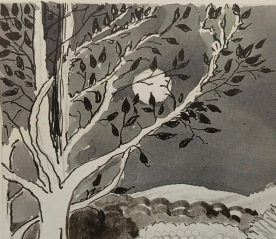March 25, the downfall of Sauron, is the date chosen by the Tolkien Society to celebrate Tolkien Reading Day. This year’s theme is “Home and Hearth: the many ways of being a Hobbit.” Around the world different groups will be holding events celebrating Tolkien’s work — see the Tolkien Society page for reports from some of them — or individuals will simply be reading their favorite passages at home. Check out the #TolkienReadingDay hashtag on Twitter or Instagram to see what people are reading today.
One of the ways of being a hobbit is to love songs, often songs celebrating simple homely pleasures: “Sing hey! for the bath at close of day,” “Ho! Ho! Ho! to the bottle I go,” “Upon the hearth the fire is red,” or songs that are just meant to be fun, such as the “ridiculous song” Frodo sings at the Prancing Pony, “There is an inn,” or that Sam recites as “just a bit of nonsense,” his song about trolls.
There is one song that Sam sings, however, that is much more serious and that shows another side of being a hobbit: the ability to find hope in the face of overwhelming odds. That song is “In western lands.” I’ve always loved this poem and especially one beautiful image in it.
The song occurs in The Return of the King in “The Tower of Cirith Ungol” chapter. Frodo has been captured by orcs, and Sam is feeling defeated, unable to find him. Suddenly, he starts singing, and gradually his voice rises and the words of the poem come to him “unbidden.” The song calls forth a response from Frodo, allowing Sam to locate him in the Tower.
In the song, the speaker situates himself in the farthest reaches of despair: “Though here at journey’s end I lie/ in darkness buried deep,/ beyond all towers strong and high,/ beyond all mountains steep” — and yet, he can imagine that this is not the entire world. “In western lands, beneath the Sun/ the flowers may rise in Spring…” He imagines a blooming world that “may” be alive, and by the end of the poem, he is certain that there is an eternal world elsewhere that is not affected by his seemingly hopeless situation: “above all shadows rides the Sun/ and Stars for ever dwell….” The final lines express his resolve: “I will not say the Day is done, / nor bid the Stars farewell.”

My favorite lines come in the first stanza: “Or there maybe ’tis cloudless night / and swaying beeches bear / the Elven-stars as jewels white / amid their branching hair.” Tolkien’s landscapes are usually alive and active; here, the trees and stars, two recurring and significant images for Tolkien, are connected in one image of softly dancing trees whose branches seem to be wearing the jewellery of starlight as if in their hair. By the end of that first stanza, the poet’s gaze is already moving from the flowers rising from the ground up to the stars in the sky, as if getting ready for the ideas that conclude the second stanza. I remember one summer night sitting outside, looking up through tree branches at a few stars, when these lines came immediately to mind as the perfect expression of that sight.
Donald Swann set this poem to music, although I think I prefer the Tolkien Ensemble version of it. You can listen to it here:
The hope of hobbits — little people who did not think they could change the world — is a valuable thought to hold on to.
5 responses to “Tolkien Reading Day: the hope of hobbits”
I love this part in The Return of the King! Sam’s already one of my favorite characters, and this just makes me like his character more!
LikeLiked by 1 person
A great post, I love how you’ve tied in this song and the hope of Hobbits with the theme, today has really given me the nudge to re read again. Thanks for sharing, I’m now going to read some more of your posts!
LikeLiked by 1 person
Reblogged this on charles french words reading and writing and commented:
This is a wonderful post, especially on National Tolkien Reading Day, about the hope that exists in Tolkien’s writings.
LikeLiked by 1 person
Thanks for the reblog!
LikeLike
Thank you for a wonderful post!
LikeLiked by 1 person